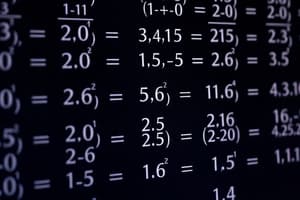Podcast
Questions and Answers
What is the process of breaking down a larger quantity into smaller parts called?
What is the process of breaking down a larger quantity into smaller parts called?
- Division
- Factorization (correct)
- Multiplication
- Addition
In the expression 3^4, what does the '4' represent?
In the expression 3^4, what does the '4' represent?
- Addition of the base value
- Subtraction of the base value
- Multiplication of the base value
- The exponent of the base value (correct)
Which operation do you perform when dealing with exponents?
Which operation do you perform when dealing with exponents?
- Multiplication (correct)
- Addition
- Subtraction
- Division
What does direct variation mean with respect to two variables?
What does direct variation mean with respect to two variables?
If x^2 + 5x + 6 = 0, what are the roots after factoring?
If x^2 + 5x + 6 = 0, what are the roots after factoring?
Which mathematical concept involves expressing an expression as a product of simpler expressions?
Which mathematical concept involves expressing an expression as a product of simpler expressions?
In an inverse variation, if one variable doubles, what happens to the other variable?
In an inverse variation, if one variable doubles, what happens to the other variable?
What is the relationship between the distance covered (x), the time taken (t), and the speed (v) of a vehicle?
What is the relationship between the distance covered (x), the time taken (t), and the speed (v) of a vehicle?
What is the purpose of factoring a quadratic equation like $5x^2 + 2x + 1 = 0$?
What is the purpose of factoring a quadratic equation like $5x^2 + 2x + 1 = 0$?
How can understanding the concepts of direct and inverse variation help in solving mathematical problems?
How can understanding the concepts of direct and inverse variation help in solving mathematical problems?
What is the relationship between the variables in an inverse variation scenario?
What is the relationship between the variables in an inverse variation scenario?
Flashcards are hidden until you start studying
Study Notes
Class 8 Maths: Topics of Factorization, Exponents, and Variations
Factorization
Factorization, often referred to as finding the factors of a whole, is a crucial concept in mathematics. It involves breaking down a larger quantity into smaller parts called factors. In algebraic terms, it's the act of expressing an expression as a product of simpler expressions. For instance, consider the quadratic equation x^2 + 2x + 1 = 0. By factoring it, we obtain (x+1)^2 = 0, which gives us the two roots x = -1. Similarly, we can factorize other algebraic expressions like polynomial equations or matrices to derive deeper insights or solve specific problems.
Exponents
An exponent is a mathematical operation where a base value is multiplied by itself for a specified number of times. The result is expressed as a power. For example, in the expression 5^2, 5 is the base and 2 is the exponent. This translates to multiplying 5 by itself twice, resulting in 5*5 = 25. The base can also be represented as a variable, such as x^3, which represents x multiplied by itself three times. Understanding exponents and their rules, like exponent addition and multiplication, plays a significant role in understanding advanced mathematical concepts, particularly in higher education.
Direct and Inverse Variations
Direct variation occurs when two variables change together in the same direction, meaning that if one variable increases, so does the other by a constant amount. Conversely, inverse variation occurs when two variables change in opposite directions such that if one variable doubles, the other decreases by half. These concepts are fundamental in understanding relationships between quantities. For example, consider the distance covered by a vehicle as x miles in t hours at a speed of v miles per hour. Here, v varies directly with x and time t, but inversely with distance, which holds true for any form of transport. By applying these principles, we can analyze various real-world scenarios involving proportional relationships.
To illustrate how these topics interconnect, let's consider a practical scenario where you're given a quadratic equation like 5x^2 + 2x + 1 = 0 and you need to factorize it. To solve this problem, you would use exponent rules to simplify the expression by factoring out common terms. This process allows you to express the equation in its simplest form, which could correspond to an inverse variation scenario where increasing one variable decreases another proportionally. By understanding these concepts, you can tackle a wide range of mathematical problems that arise in various fields, ranging from physics to economics.
Studying That Suits You
Use AI to generate personalized quizzes and flashcards to suit your learning preferences.




